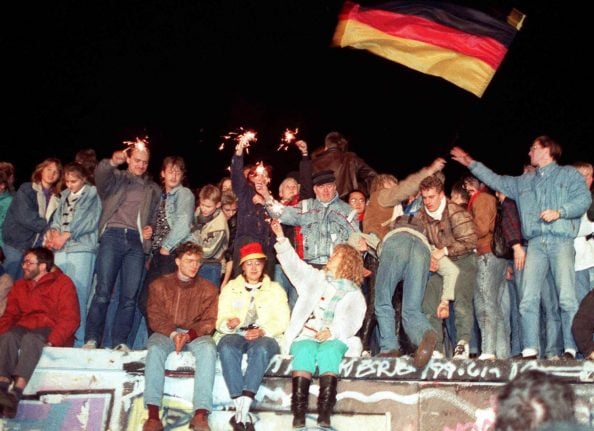“Suddenly they opened the gate!” recalled Berliner Andreas Falge, one of the first to cross the East German border into the West on November 9th, 1989.
Still in wonder 30 years after the epochal event, Falge said. “Everyone started running! And so did I.”
A smile on his face, the 61-year-old is back on Berlin's Bornholmer Straße, once a sealed border point in the long-impenetrable Iron Curtain, recalling that “incredible night”.
When the Berlin Wall cracked open here after 28 years, Falge was part of the roaring, jubilant crowd of East Berliners who were first to head west.
The masses were shouting “Open the gate! Open the gate!” said Falge, a technician at East Berlin's storied Babylon cinema at the time.
The roadblocks of the Cold War era have long since disappeared, and a discount supermarket and train station now dominate the nearby square, renamed November 9th,1989 Square.
For all of The Local's coverage on the Berlin Wall click HERE
 Berliners brought hammers and chisels when the Wall opened. Photo: DPA
Berliners brought hammers and chisels when the Wall opened. Photo: DPA
“I came here, to the end of this bridge,” said Falge, now with salt and pepper hair, revisiting the scene.
“There was a human tide moving and people said: 'Did you hear the news? Did you hear the news?'”
'Guards didn't know'
The news was the announcement, made by a confused communist state official at a press conference, that East Germans would be allowed to travel to the west “immediately”.
That bumbling performance was broadcast on West German TV, which many easterners watched clandestinely, and it kicked off a human avalanche.
READ ALSO: Berlin Wall fall: The unbelievable moment that changed the world forever
Falge said he stared at the TV, then jumped up, pulled on his leather jacket and grabbed 100 West German Deutschmarks and a map of West Berlin.
“I had no idea if the border was already open or not,” he said, “but screw it, let's go!”
Soon he stood with hundreds of others at the border crossing, facing nervous East German border guards who had also been utterly surprised by the dramatic turn of events.
“I was thinking, 'My God, if things turn sour! … I was watching out in case one of them pulled a gun.”
“You could see that the border guards didn't know what to do… Everyone was shouting 'Open the gate!'”
'Bright shining lights'
All were stunned when the guards finally relented around 11:30pm, allowing pedestrians and honking Trabant cars.
Being one of the first to cross, Falge was afraid he would not be able to come back in and so he followed regular procedures by going to the guards for his passport to be stamped.
Eventually, the flow of people became so large that they stopped checking papers altogether.
 GDR border guards close a hole in the Berlin Wall on November 11th 1989. Photo: DPA
GDR border guards close a hole in the Berlin Wall on November 11th 1989. Photo: DPA
“I went there, right across the street, you know?” said Falge, pointing at the western Wedding district.
Soon he saw police officers whose uniforms were a “weird brown and spinach green. That's when I realised: I'm in the goddamn West!”
He walked into a neighbourhood pub shrouded in cigarette smoke.
“I opened the door and said to myself, 'Great, this is the West and its bright shining lights,'” he laughs.
In an era long before smartphones, the regulars were oblivious to the historic event playing out just a few hundred metres away.
Sleepless night
Although he'd never considered fleeing the GDR, cinema and music fan Falge had a few friends in West Berlin, and now was the time for a surprise visit.
He telephoned one of them, Wolfgang, who had in the past been able to visit him in the East.
“He tells me he's happy I'm calling him. I told him: 'stop talking and come and pick me up instead'.”
READ ALSO: How Berlin is marking 30th anniversary of the fall of the Wall
After a silence, Wolfgang said: “Pick you up? But where are you?”
When Falge explained he was in Wedding, his friend couldn't believe it.
“Well, yes, they just opened the Wall,” he said.
“And then I hear on the other end of the line: 'Holy crap'.”
He ended up taking a taxi to Wolfgang's and on the way he remembered thinking the West did not look so different to his side of the city – except for the “neon-lit shops” and their eye-watering prices.
A long and sleepless night in Wolfgang's apartment followed, where his friend's two roommates Claudia and Michael were stunned to find him “sitting on the couch, a Beck's beer in hand”.
The next day, he went back to work in East Berlin, but the cinema was almost empty.
“So we closed the Babylon,” he smiles. “And we went to celebrate the fall of the Wall.
READ ALSO: Zeitzeugen: Meet the Scottish artist who left her mark on the Berlin Wall
By Yannick Pasquet



 Please whitelist us to continue reading.
Please whitelist us to continue reading.
Member comments